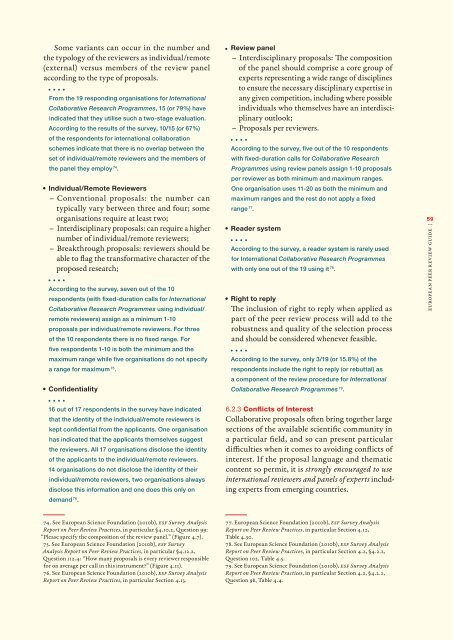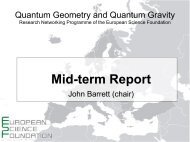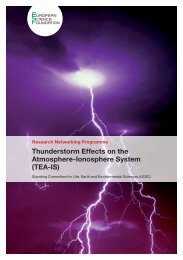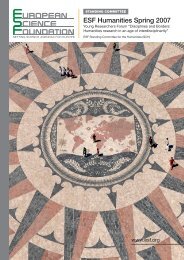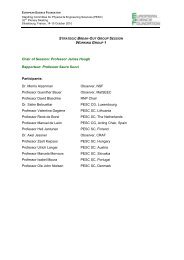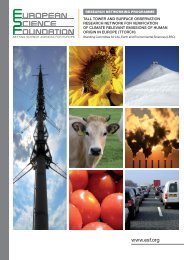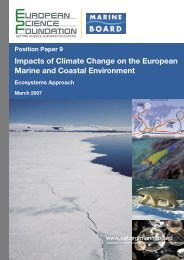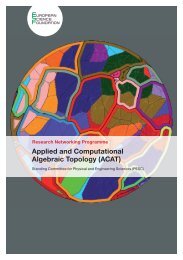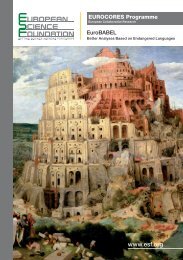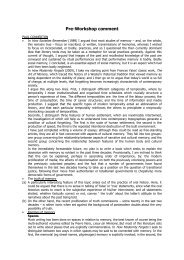European Peer Review Guide - European Science Foundation
European Peer Review Guide - European Science Foundation
European Peer Review Guide - European Science Foundation
Create successful ePaper yourself
Turn your PDF publications into a flip-book with our unique Google optimized e-Paper software.
Some variants can occur in the number and<br />
the typology of the reviewers as individual/remote<br />
(external) versus members of the review panel<br />
according to the type of proposals.<br />
From the 19 responding organisations for International<br />
Collaborative Research Programmes, 15 (or 79%) have<br />
indicated that they utilise such a two-stage evaluation.<br />
According to the results of the survey, 10/15 (or 67%)<br />
of the respondents for international collaboration<br />
schemes indicate that there is no overlap between the<br />
set of individual/remote reviewers and the members of<br />
the panel they employ 74 .<br />
• Individual/Remote <strong>Review</strong>ers<br />
– Conventional proposals: the number can<br />
typically vary between three and four; some<br />
organisations require at least two;<br />
– Interdisciplinary proposals: can require a higher<br />
number of individual/remote reviewers;<br />
– Breakthrough proposals: reviewers should be<br />
able to flag the transformative character of the<br />
proposed research;<br />
According to the survey, seven out of the 10<br />
respondents (with fixed-duration calls for International<br />
Collaborative Research Programmes using individual/<br />
remote reviewers) assign as a minimum 1-10<br />
proposals per individual/remote reviewers. For three<br />
of the 10 respondents there is no fixed range. For<br />
five respondents 1-10 is both the minimum and the<br />
maximum range while five organisations do not specify<br />
a range for maximum 75 .<br />
• Confidentiality<br />
• <strong>Review</strong> panel<br />
– Interdisciplinary proposals: The composition<br />
of the panel should comprise a core group of<br />
experts representing a wide range of disciplines<br />
to ensure the necessary disciplinary expertise in<br />
any given competition, including where possible<br />
individuals who themselves have an interdisciplinary<br />
outlook;<br />
– Proposals per reviewers.<br />
According to the survey, five out of the 10 respondents<br />
with fixed-duration calls for Collaborative Research<br />
Programmes using review panels assign 1-10 proposals<br />
per reviewer as both minimum and maximum ranges.<br />
One organisation uses 11-20 as both the minimum and<br />
maximum ranges and the rest do not apply a fixed<br />
range 77 .<br />
• Reader system<br />
According to the survey, a reader system is rarely used<br />
for International Collaborative Research Programmes<br />
with only one out of the 19 using it 78 .<br />
• Right to reply<br />
The inclusion of right to reply when applied as<br />
part of the peer review process will add to the<br />
robustness and quality of the selection process<br />
and should be considered whenever feasible.<br />
According to the survey, only 3/19 (or 15.8%) of the<br />
respondents include the right to reply (or rebuttal) as<br />
a component of the review procedure for International<br />
Collaborative Research Programmes 79 .<br />
59<br />
<strong>European</strong> <strong>Peer</strong> <strong>Review</strong> <strong>Guide</strong><br />
16 out of 17 respondents in the survey have indicated<br />
that the identity of the individual/remote reviewers is<br />
kept confidential from the applicants. One organisation<br />
has indicated that the applicants themselves suggest<br />
the reviewers. All 17 organisations disclose the identity<br />
of the applicants to the individual/remote reviewers.<br />
14 organisations do not disclose the identity of their<br />
individual/remote reviewers, two organisations always<br />
disclose this information and one does this only on<br />
demand 76 .<br />
6.2.3 Conflicts of Interest<br />
Collaborative proposals often bring together large<br />
sections of the available scientific community in<br />
a particular field, and so can present particular<br />
difficulties when it comes to avoiding conflicts of<br />
interest. If the proposal language and thematic<br />
content so permit, it is strongly encouraged to use<br />
international reviewers and panels of experts including<br />
experts from emerging countries.<br />
74. See <strong>European</strong> <strong>Science</strong> <strong>Foundation</strong> (2010b), ESF Survey Analysis<br />
Report on <strong>Peer</strong> <strong>Review</strong> Practices, in particular §4.10.2, Question 99:<br />
“Please specify the composition of the review panel.” (Figure 4.7).<br />
75. See <strong>European</strong> <strong>Science</strong> <strong>Foundation</strong> (2010b), ESF Survey<br />
Analysis Report on <strong>Peer</strong> <strong>Review</strong> Practices, in particular §4.12.2,<br />
Question 112.4: “How many proposals is every reviewer responsible<br />
for on average per call in this instrument?” (Figure 4.11).<br />
76. See <strong>European</strong> <strong>Science</strong> <strong>Foundation</strong> (2010b), ESF Survey Analysis<br />
Report on <strong>Peer</strong> <strong>Review</strong> Practices, in particular Section 4.13.<br />
77. <strong>European</strong> <strong>Science</strong> <strong>Foundation</strong> (2010b), ESF Survey Analysis<br />
Report on <strong>Peer</strong> <strong>Review</strong> Practices, in particular Section 4.12,<br />
Table 4.30.<br />
78. See <strong>European</strong> <strong>Science</strong> <strong>Foundation</strong> (2010b), ESF Survey Analysis<br />
Report on <strong>Peer</strong> <strong>Review</strong> Practices, in particular Section 4.2, §4.2.2,<br />
Question 102, Table 4.5.<br />
79. See <strong>European</strong> <strong>Science</strong> <strong>Foundation</strong> (2010b), ESF Survey Analysis<br />
Report on <strong>Peer</strong> <strong>Review</strong> Practices, in particular Section 4.2, §4.2.2,<br />
Question 98, Table 4.4.


